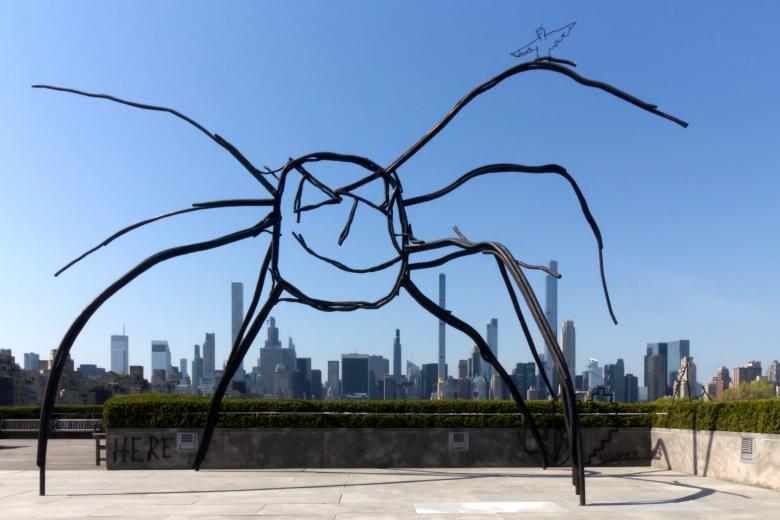29. aprile 2024
All photographs by John Hill/World-Architects
Kosovar artist Petrit Halilaj has installed Abetare on the roof of the Metropolitan Museum of Art in New York City for the museum's 2024 Roof Garden Commission. The exhibition, opening on April 30, consists of sculptures inspired by children's doodles, drawings, and scribbles found on desks at schools in Kosovo, Albania, and other countries from the former Yugoslavia.
It's hard not to like the Met's annual Roof Garden Commission, which brings ambitious artwork to a stunning setting and arrives as the weather warms and people are spending more time outside. We visited in September 2020, when the installation was delayed a few months due to the pandemic, to see Mexican artist Héctor Zamora's site-specific Lattice Detour, and then last year we took in Lauren Halsey's the eastside of south central los angeles hieroglyph prototype architecture (I) on a fittingly foggy April morning. This morning's press preview took place on a sunny, unseasonably warm spring day, an equally appropriate setting for Halilaj's childlike bronze and steel sculptures.
“Furtive drawings from kids' desks have been enlarged into three-dimensional metal sculptures,” the wall text explains, “each retaining the trace of the original.” The one that grabs a visitor's attention first is the large spider with an almost menacing smile.
The drawing that the spider sculpture is based on — on a desk the artist saved from a school in North Macedonia before it was destroyed — is included as a small etching in one corner of the sign with the wall text.
Abetare, the wall text continues, “borrows its title from the book the artist and his peers used to learn the alphabet at school, each letter linked to a lesson in pictures and text.”
Most interesting, especially for architects, is the way the “drawings in space” merge with the surroundings, such that a blocky heart and other doodles overlap with a view of the distant Billionaires' Row skyline south of Central Park.
In other parts of the roof garden, the relationship between viewer, art, and distant buildings creates interesting juxtapositions.
I couldn't help think the artist wanted us to imagine one of the school kid's dancing across the distant roof, a leavening of a heavy theme at the heart of the work: kids experiencing and becoming refugees during the wars in the Balkan region in the 1990s.
The sculptures can be walked under as well as around, such that the drawings are “suspended in sky.”
In turn, the doodles are also “drawn” on the paving as shadows cast by sunlight.
Elsewhere on the roof garden, the doodles are mounted to the museum's walls, tracing the stone blocks — one instance where viewers realize Abetare is as site-specific as it is remote in its inspiration.









